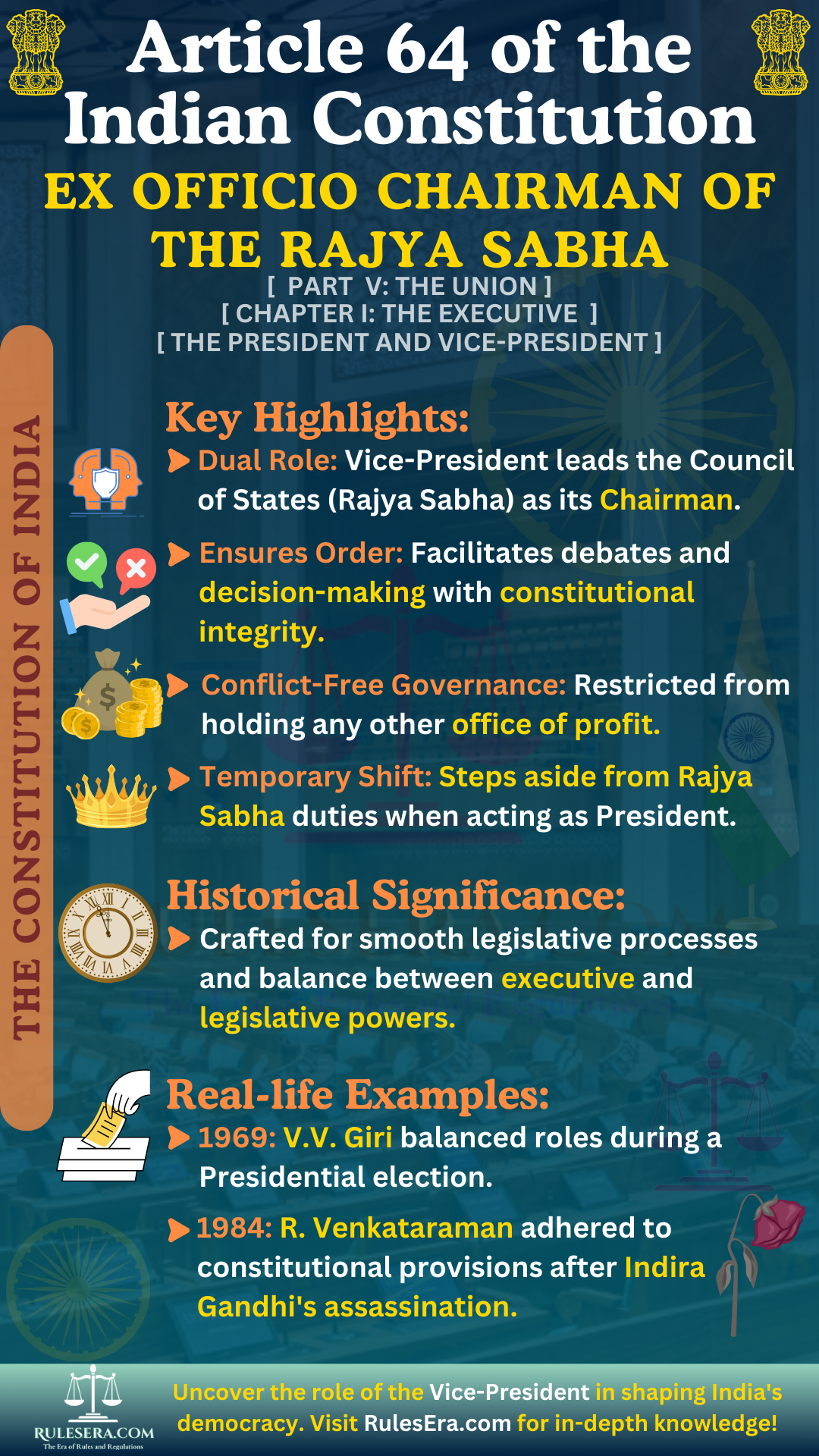Part V: The Union
Chapter I: The Executive
Article 64: The Vice-President to be Ex Officio Chairman of the Council of States

--- Original Article ---
The Vice-President shall be ex officio Chairman of the Council of the States and shall not hold any other office of profit:
Provided that during any period when the Vice-President acts as President or discharges the functions of the President under Article 65, he shall not perform the duties of the office of Chairman of the Council of States and shall not be entitled to any salary or allowance payable to the Chairman of the Council of States under Article 97.
Explanation
Article 64 of the Constitution of India outlines a dual role for the Vice-President, serving as the ex officio Chairman of the Council of States, or Rajya Sabha. This provision ensures that the Vice-President has a formal legislative function, primarily as the presiding officer of the upper house, while also limiting their ability to hold any other office of profit. The article also references Article 97, which governs the salary and allowances of the Chairman, and includes provisions for special circumstances when the Vice-President is temporarily discharging the duties of the President.
Key Provisions
- 1. Ex Officio Chairman of the Council of States:
Under Article 64, the Vice-President assumes the role of Chairman of the Rajya Sabha as a matter of office. As the presiding officer, the Vice-President is responsible for maintaining order and regulating proceedings of the Council of States, ensuring that debates and decisions are conducted within the constitutional framework. - 2. Prohibition on Holding Other Office of Profit:
The Vice-President, while serving as Chairman of the Council of States, is restricted from holding any other office of profit. This safeguard is in place to prevent any potential conflicts of interest and ensures the Vice-President’s undivided attention to their constitutional duties. - 3. When Acting as President – Reference to Article 97:
A significant proviso is introduced in Article 64, which states that if the Vice-President is acting as or discharging the functions of the President (as per Article 65), they must temporarily step down from the duties of Chairman of the Rajya Sabha. During this period, as referenced in Article 97, the Vice-President is not entitled to receive the salary or allowances designated for the Chairman of the Council of States. Instead, they receive the compensation associated with the office of the President, as detailed in Article 59.
Amendments and Real-Life Examples
- Amendments: Although no direct amendments to Article 64 have been made, its interaction with Article 65, which lays down the circumstances under which the Vice-President assumes the role of the President, and Article 97 concerning remuneration, makes it an integral part of the overall framework of presidential succession.
- Real-Life Examples:
- 1969 - Vice-President V.V. Giri: A notable instance occurred in 1969 when Vice-President V.V. Giri resigned from his position as both the Vice-President and Chairman of the Rajya Sabha to contest the Presidential election. During this period, as he was acting as President following the death of Dr. Zakir Husain, his duties as Chairman were handed over to the Deputy Chairman of the Rajya Sabha. This illustrates how Article 64, along with the reference to Article 97, functions in practice, balancing responsibilities between the executive and legislative roles.
- 1984 - Assassination of Prime Minister Indira Gandhi: During the 1984 assassination of Prime Minister Indira Gandhi, Vice-President R. Venkataraman temporarily assumed the role of Acting President after the passing of President Giani Zail Singh. In accordance with Article 64, Venkataraman refrained from performing his duties as Chairman of the Rajya Sabha until a new President was elected, and as per Article 97, he was compensated only for his role as Acting President. This situation exemplifies how the Constitution ensures that no one individual holds excessive power while maintaining financial integrity in the management of dual roles.
Historical Significance
The framers of the Constitution designed Article 64 to ensure a smooth legislative process in the Rajya Sabha by entrusting the Vice-President with the role of Chairman. This unique position of the Vice-President within both the executive and legislative branches reflects India's parliamentary framework, where the Vice-President stands as a key constitutional figure without holding direct executive power, except under Article 65.
Legislative History
Article 64 of the Indian Constitution, originally introduced as Article 53 in the Draft Constitution on December 28, 1948, was adopted with minimal debate.
Debates and Deliberations:
During the drafting process, Dr. B.R. Ambedkar proposed two key amendments to the original text of Article 64. He recommended replacing the phrase "or position of emolument" with "or profit" to clarify that the Vice-President should not hold any office leading to financial gain or a conflict of interest. Additionally, he proposed that when the Vice-President discharges the duties of the President, they should not receive the salary or allowances of the Chairman of the Rajya Sabha, receiving only the remuneration of the President's office. These amendments were accepted without further debate, establishing a clear framework for the Vice-President’s roles and compensation during temporary presidential duties, ensuring no financial conflict arises.
Frequently Asked Questions (FAQs):
The Vice-President serves as the ex officio Chairman of the Rajya Sabha and is responsible for maintaining order and regulating the proceedings of the house.
During such a period, the Vice-President temporarily steps down from their duties as Chairman of the Rajya Sabha, and they are not entitled to the salary or allowances of the Chairman.